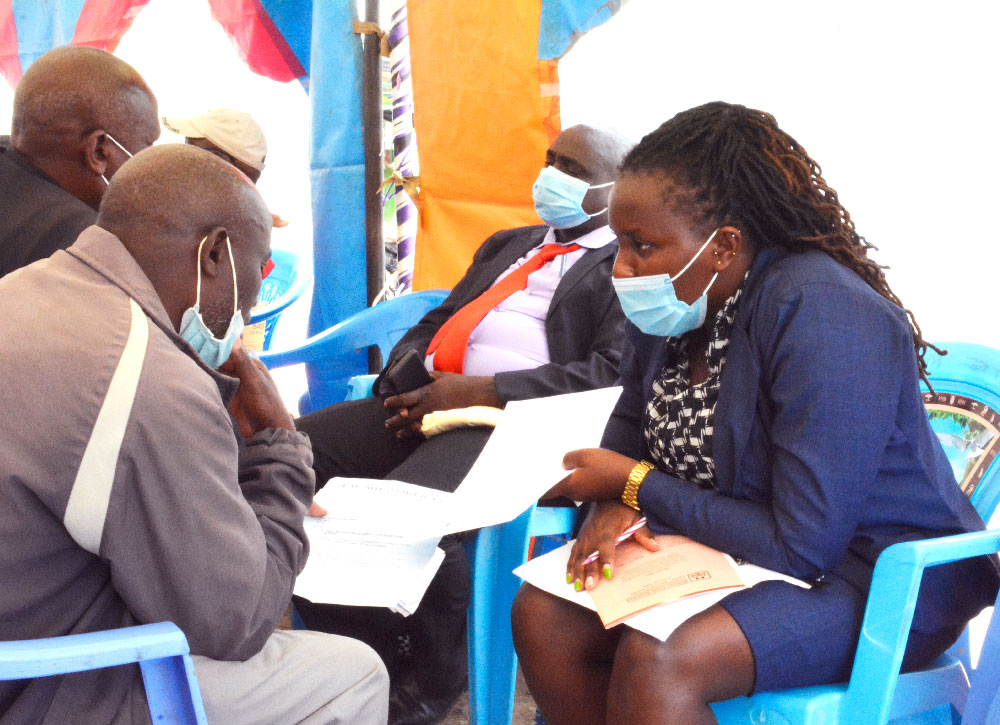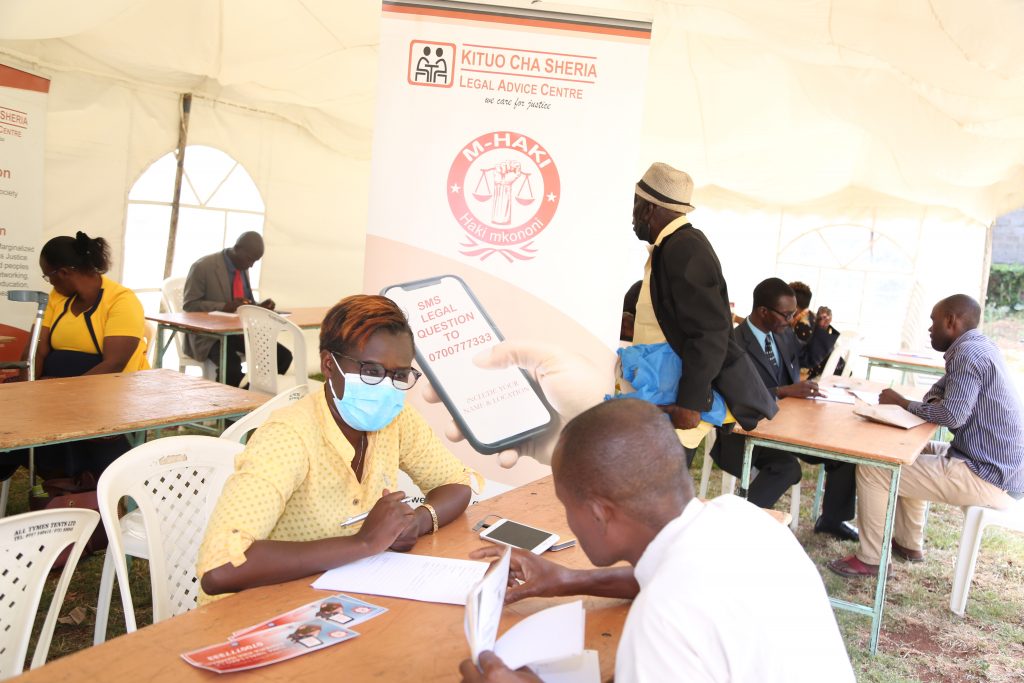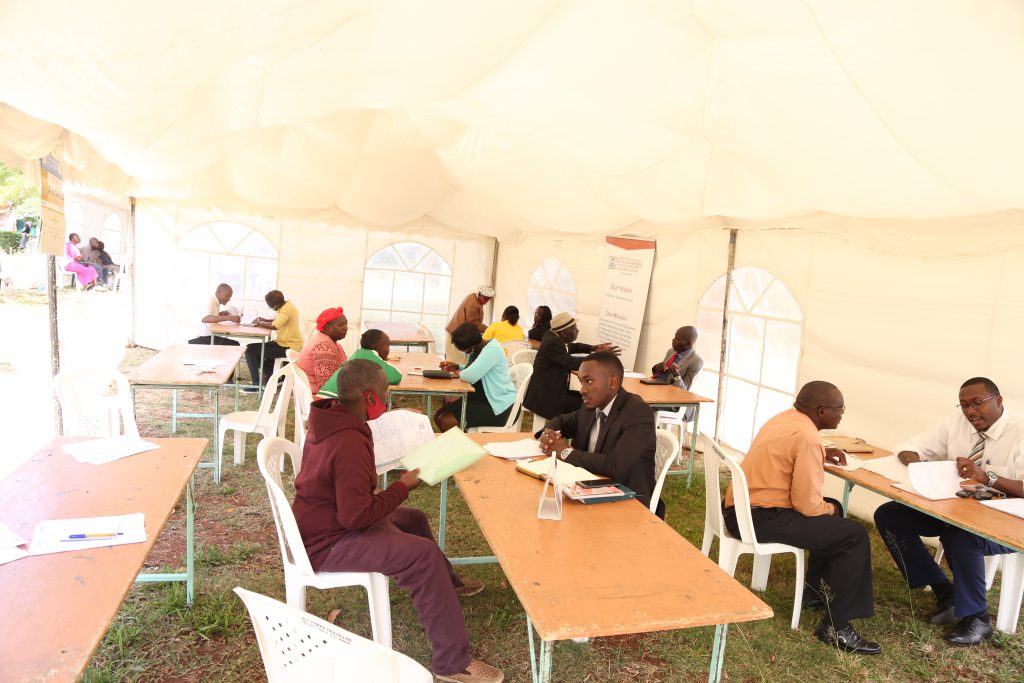LEGAL AID AND EDUCATION PROGRAMME
Goal: Indigent and marginalized persons in Kenya having access to justice through legal aid and empowerment.
The strategic objectives of the programme are:
- To provide legal aid to indigent and marginalized persons in the selected counties and prisons.
- To source, develop and motivate staff in the department including volunteer advocates for optimal performance.
- To build the capacity of communities for self-representation and public interest litigation matters.
- To build the capacity of advocates on litigation.
- To establish partnerships with Volunteer Advocates and caucuses and enhance Bar relationships
- To sensitize and communicate to larger society on access to justice.
- To procure facilities for operations and accessing courts in the remote and underdeveloped areas of Kenya.

The Legal Aid and Education Programme is managed through in-house lawyers and volunteer advocates service (VAs). They offer mobile outreach legal education and aid to KITUO’s clients through legal representation and mediation.

The concept of legal aid and education is based on the assistance of the socially and economically disadvantaged persons in the society to enable them understand and protect their rights. The justice and legal system in Kenya is not equally accessible to everybody. The financially disadvantaged people, the persons living with disabilities and minority groups often experience particular difficulty in accessing justice. The development of Legal Aid and Education Proramme’s historical background can be traced back to a time when the question of legal aid by the Legal aid providers demanded serious strategies of offering legal aid.
KITUO developed Legal Aid and Education Programme to respond to its client’s needs for legal aid. This is because the national legal system whose main function is to safeguard people’s rights has not fully functioned for the poor and marginalized people since they cannot equitably access it. In May 1998, the Attorney General’s Office (AG’s) together with other stakeholders, notably, the International Commission of Jurists (ICJ-Kenya Section), KITUO, the International Federation of Women Lawyers (FIDA-Kenya), the Public Law Institute (PLI) and the Law Society of Kenya (LSK) (then referred to as ‘The Working Committee’), organized a Legal Aid Workshop in Mombasa. The workshop was supported by Department for International Development (DFID) and the British Council supported the administration of the workshop.

During the workshop, it was agreed that a legal aid scheme was urgently required. The workshop proceeded to consider a possible model for Kenya and in September 1999, Stakeholder-based Legal Aid Steering Committee (LASC), established by the Attorney General’s Office. The committee was assigned the task of developing a legal aid scheme, commissioning a consultancy funded by DFID to design a Pilot Programme for testing a suitable model(s) for a National Legal Aid Scheme in Kenya. The consultants conducted a broad-based and highly consultative study which culminated in a report containing the design of a legal education and aid pilot programme (LEAPP) in 2001.
It is recognized that from the outset, development of a Legal Education and Aid Scheme was a collaborative one between the government and civil society. Thus, the proposed scheme assumed this collaboration and defined the duties and responsibilities of the role-players on that basis. There are broader reform programmes such as poverty alleviation, which inform the context within which legal reforms are taking place. It is noteworthy that Legal Aid and Education Programme cannot take place in isolation from other reform initiatives.
The introduction of High Court Divisions, small claims courts and new procedures in Children’s Courts, and the reorganization of registries, provided opportunities for tackling the need for Access to Justice in an integrated manner.
The legal aid and education programme within KITUO focuses on policy advocacy and law reform in the areas of Land rights; Housing and Labour rights; Refugee rights; Internally Displaced Person’s (IDPs); and other areas such as Criminal, Alternative Dispute Resolution/mediation. Under the legal aid programme core activities include; provision of legal services to walk-in clients (at the Head Office and the branch offices in Nairobi and Mombasa respectively) as well as through mobile legal aid clinics country-wide.
The programme also undertakes the training of community groups and paralegal officers in efforts to enhance their capacity in legal aid work.

